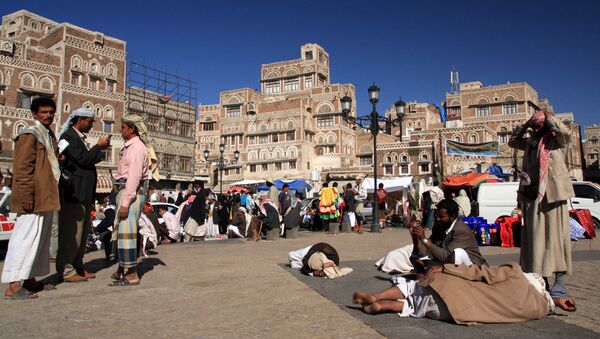WASHINGTON, October 1 (RIA Novosti), Lyudmila Chernova -The lack of attention from the outside parties, little pledged help actually delivered as well as weakness of the central government have fueled the ongoing protests in Yemen, Dr. Christian Koch of Gulf Research Foundation based in Geneva, Switzerland told RIA Novosti on Wednesday.
"The lack of attention paid by all outside actors and the fact that little of the assistance that was pledged to Yemen through the Friends of Yemen process has actually been delivered has all contributed to the current situation as the central government by itself is simply too weak to handle the many forces that are trying to take Yemen apart," Koch said.
He stressed that issue like the Houthi rebellion, the threat from al-Qaeda elements, or the threatened secession of the south "are all not new and without sufficient attention being paid to them, they tend to escalate rather quickly."
"Added to that is the regional environment that has equally begun to fall part also being fuelled by internal division among the GCC states - for example, Qatar vs. Saudi Arabia/UAE -, the contentious politics between Saudi Arabia and Iran, and other external actors like the US and Europe being preoccupied by Syria, the rise of IS [Islamic State], and Libya," Koch asserted.
The expert believes that another key factor is that there is no one in particular responsible within Saudi Arabia for the Yemeni file as it was under the control of former Crown Prince Sultan Bin Abdulaziz before he passed away a few years ago.
"Instead, aspects of Yemen are under the control of different institutions in Saudi Arabia with the Interior Ministry handling security issues, the Ministry of Foreign Affairs handling the foreign policy issues and the Royal Diwan overlooking aid programs," he explained, emphasizing that there is thus no concerted centralized control over what the approach to Yemen should be like.
Koch added that anything can happen at this point, and nothing can at this stage be excluded.
He said that the possible scenarios include virtually everything from a return of Ali Abdullah Saleh, the re-assertion of control by the current government, the slow continued decay of central control including larger autonomy for group like the Houthi or even the secession of the south.
He is certain, however, that in order to prevent a complete state failure, the GCC alongside the United States, the European Union and the United Nation all need to get re-engaged with Yemen but in a concerted, coordinated manner.
"At the moment, nobody is pulling along the same string or with the same commitment and this has allowed unresolved conflicts to simmer and come to the forefront," Koch concluded.
EU spokesman Michael Mann told RIA Novosti on Tuesday that they condemn the violence in Yemen, and insists that all involved must respect the authority of the State. He underlined that the European Union was "constantly monitoring" the situation in this country, and kept in touch with EU Member States embassies in the Yemeni capital.
On Tuesday, in the country's capital Sanaa hundreds of the Yemenis took to the streets to protest the presence of Houthi militias in the city. People demand an immediate withdrawal of Houthis and handover of the seized facilities and properties including military weapons.
Since mid-August, Shiite Houthi insurgents across Yemen have been up in arms against the country's incumbent government, calling for economic and political reforms. They have also accused the authorities of discrimination against Zaidis, which is a sect of Shiite Islam. The uprising led to Houthi militants overrunning Sanaa in September, seizing key administrative and military infrastructure, and raiding homes of government officials, including party leaders.

